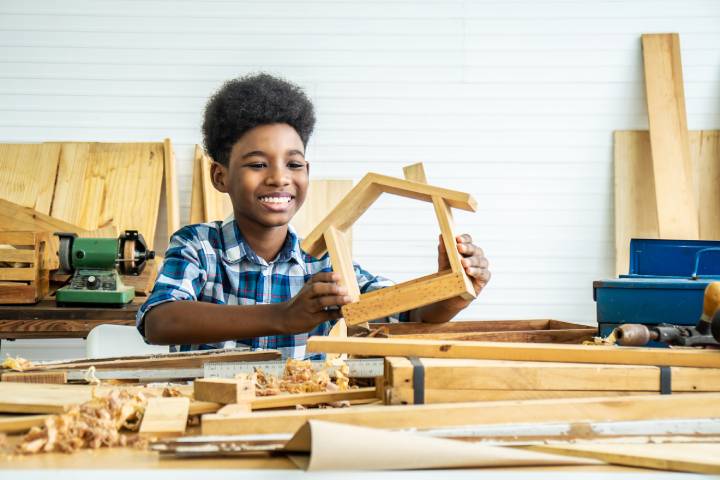
Image: Shutterstock
Parenting can sometimes feel like walking a tightrope. One common misstep you definitely want to avoid as a parent is spoiling your child. The reasons behind this are more than just cautionary tales; they’re the building blocks of a well-adjusted, resilient individual. Spoiling, as innocent as it may seem, can cast a shadow on your child’s life. It can foster entitlement and hinder their ability to go through life’s inevitable disappointments. In this article, we will delve into the intricacies of preventing your child from taking the spoilt route, providing you with practical, down-to-earth tips to ensure those little feet stay planted firmly on the ground. Read on to know more!
The Importance Of Avoiding Spoiling
Image: Shutterstock
Spoiling isn’t just about giving too many toys or treats; it’s about teaching values and life skills. When children grow up expecting everything to come easy, they might struggle later in life. Here’s why it’s essential to steer clear of spoiling your little ones:
1. Building Responsibility
Spoiling can hinder the development of a sense of responsibility. When everything is handed to a child, they miss out on the chance to learn the value of hard work and earning rewards.
2. Fostering Gratitude
A spoiled child might find it challenging to appreciate what they have. By teaching gratitude, you’re helping them understand the value of things and encouraging a positive outlook on life.
3. Promoting Independence
Image: Shutterstock
Spoiling often creates a dependency on others for fulfillment. When children are accustomed to having every need met instantly, they may struggle to develop the independence necessary for adulthood. Avoiding spoiling encourages them to take initiative, make decisions, and build confidence in their abilities.
4. Cultivating Social Skills
Excessive indulgence can isolate a child from the realities of social interactions. It’s vital for children to understand the importance of sharing, cooperation, and empathy. By avoiding spoiling, you provide opportunities for your child to engage with peers, resolve conflicts, and build meaningful relationships.They are essential skills for a well-rounded social life.
5. Handling Disappointment
Life is full of ups and downs, and learning to cope with disappointment is a crucial skill. Spoiled children may struggle more when things don’t go their way because they’re not used to facing challenges.
Practical Tips To Unspoil Your Child
Image: Shutterstock
1. Set Clear Expectations
Clearly communicate your expectations and boundaries. Let your child know what behavior is acceptable and what isn’t. Consistency is key – stick to your rules and make sure consequences are known in advance.
2. Teach Delayed Gratification
Help your child understand that good things come to those who wait. Delayed gratification is a skill that will benefit them throughout life. Start with small instances, like waiting for dessert or a turn to play, and gradually build up.
3. Encourage Chores
Image: Shutterstock
Assign age-appropriate chores to instill a sense of responsibility. This helps children understand that being part of a family means contributing and working together. Plus, it’s a great way to teach them essential life skills.
4. Limit Material Rewards
While it’s natural to want to give your child everything they desire, limiting material rewards is crucial. Instead, focus on experiences, quality time, and praise for their efforts. This helps shift the emphasis from possessions to personal growth.
5. Teach The Value Of Money
Help your child understand the concept of money by involving them in age-appropriate discussions about budgeting and saving. Allowance can be a practical tool for teaching financial responsibility and decision-making.
6. Encourage Empathy
Image: Shutterstock
Foster empathy by discussing feelings and perspectives. Help your child understand the impact of their actions on others. This not only develops emotional intelligence but also promotes a compassionate outlook on life.
7. Model Healthy Behavior
Children learn by example, so be mindful of your own behavior. Demonstrate patience, gratitude, and the ability to handle setbacks. Your actions speak louder than words, and they shape your child’s understanding of the world.
8. Promote Independence
Encourage your child to make choices and solve problems independently. This builds confidence and self-reliance. Be there to guide and support, but allow them to take age-appropriate steps toward autonomy.
9. Limit Screen Time
Image: Shutterstock
Excessive screen time can contribute to a sense of entitlement. Set reasonable limits on electronic devices and encourage a balance between online and offline activities. This fosters creativity, social skills, and a healthier lifestyle.
10. Celebrate Effort, Not Just Results
Shift the focus from perfection to effort. Praise your child for their hard work and determination, even if the outcome isn’t perfect. This reinforces the idea that the process is as important as the result.
In the big job of being a parent, making sure your child doesn’t get spoiled is an important step. When you teach them things like responsibility, gratitude, and being tough, you’re giving them what they need to handle life well. Follow these helpful tips as you take care of your kids, and don’t forget – bringing up kids who are balanced and happy is about making good habits and teaching values that will stick with them forever.


















